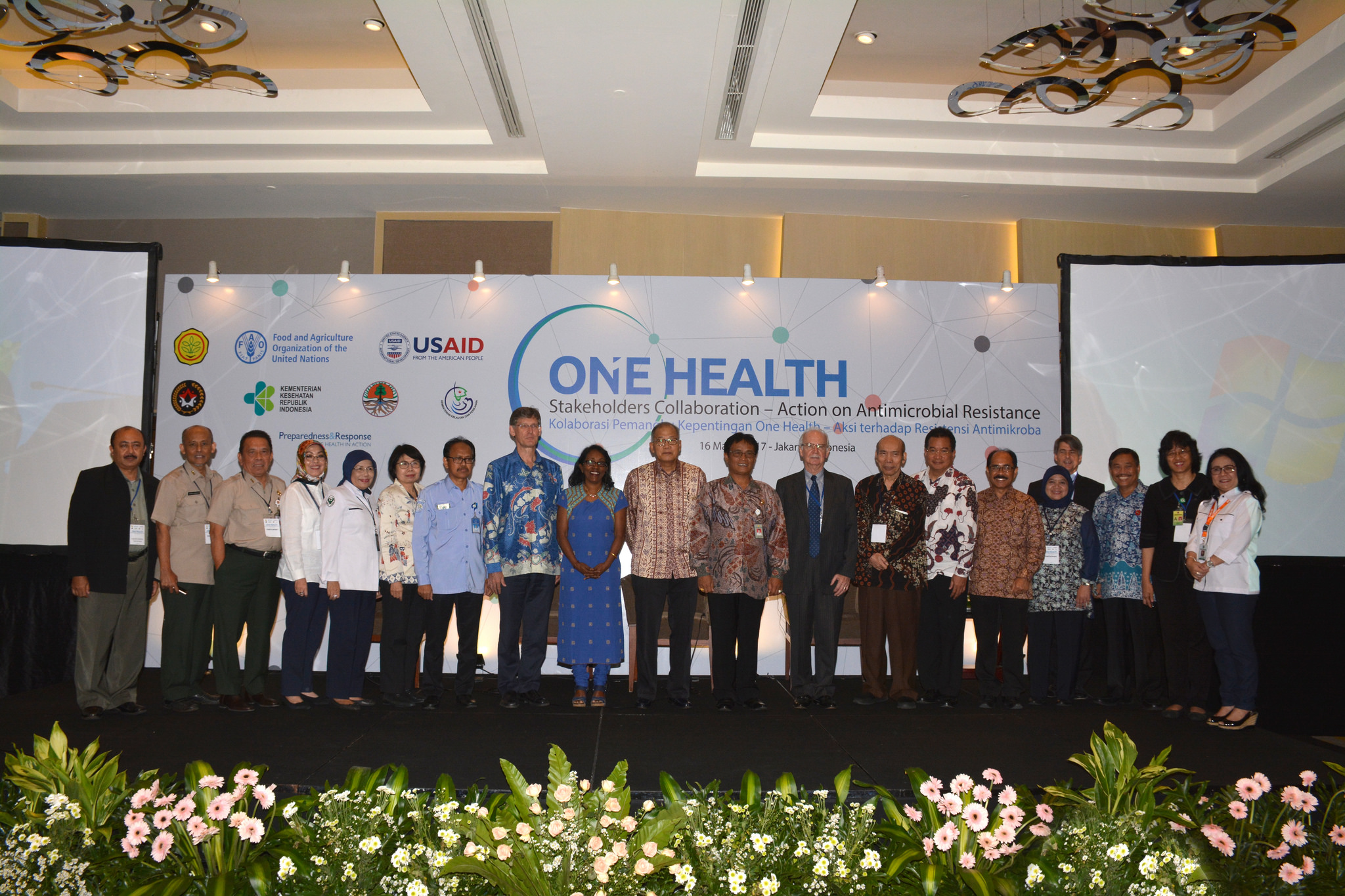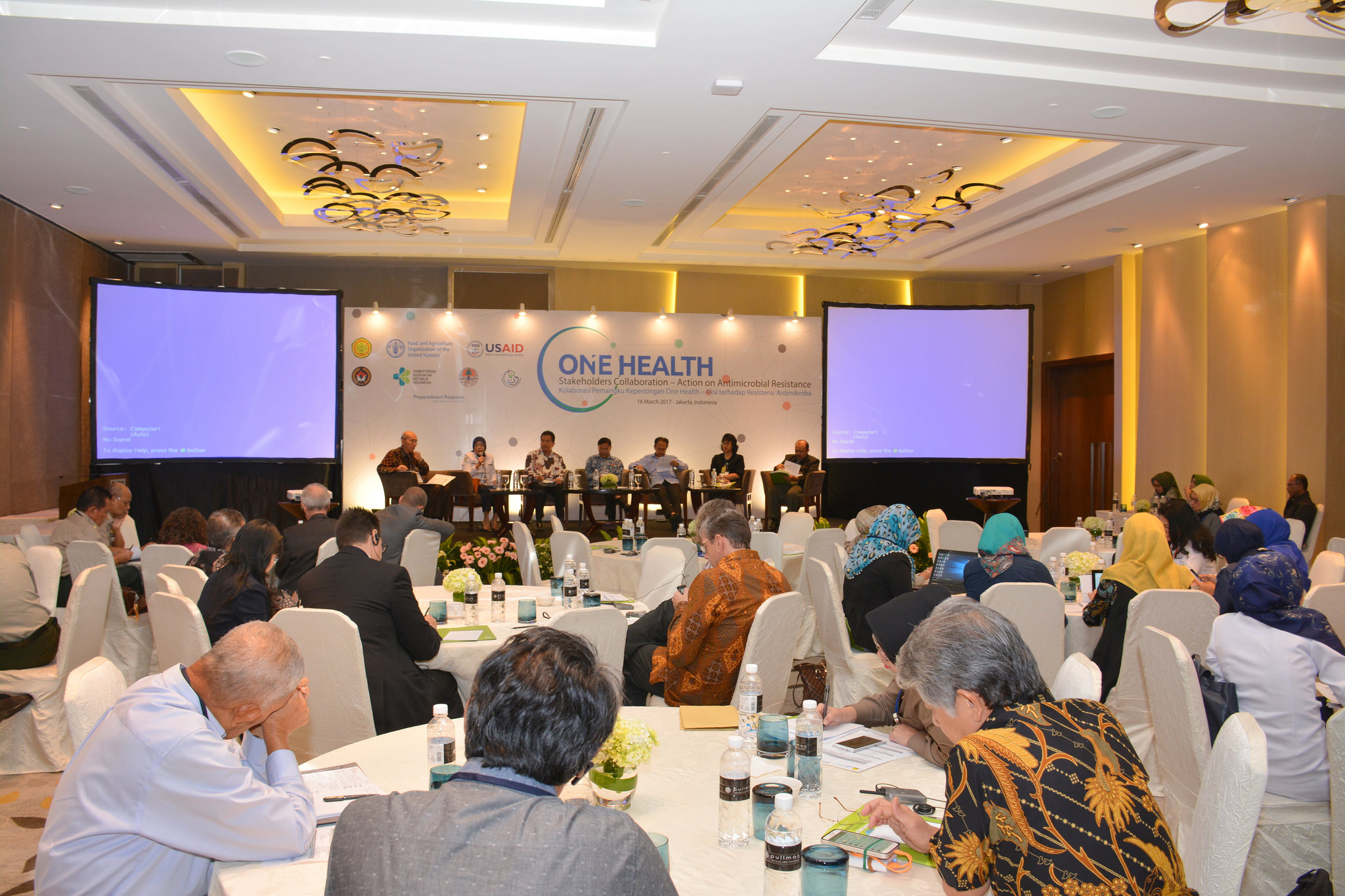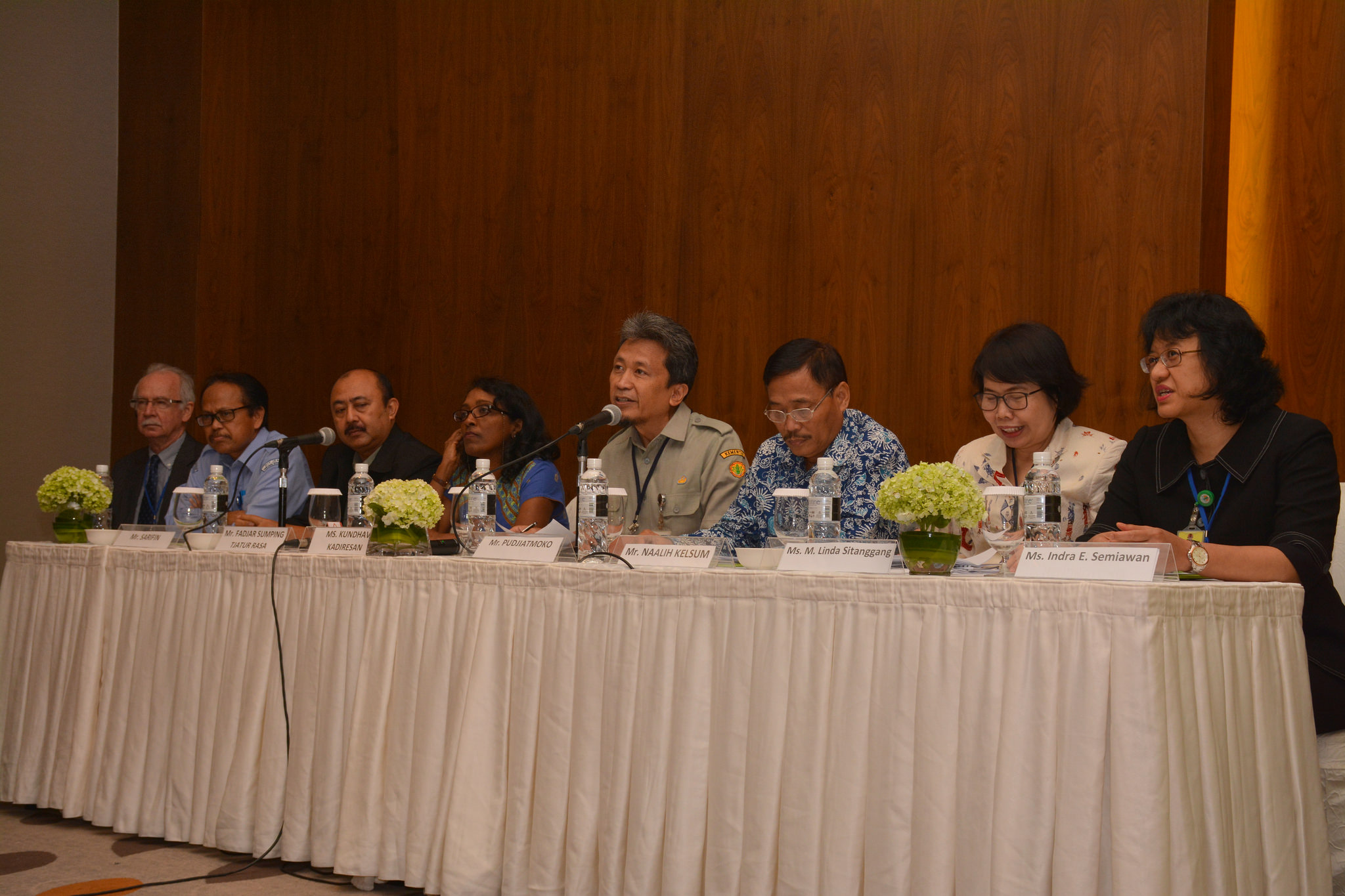Indonesian Ministries Pledge One Health Collaboration

Indonesia has confirmed its commitment to advance One Health collaboration, with five ministries issuing a joint communique recently on the implementation of One Health in the country, to respond to emerging disease threats and address global health challenges including Antimicrobial Resistance (AMR).
Gathered during the seminar on “One Health Stakeholders Collaboration – Action on Antimicrobial Resistance” held by FAO Indonesia in Jakarta on 16 March 2017, the Ministry of Agriculture (MOA), the Ministry of Health (MOH), the Ministry of Environment and Forestry (MOEF), the Ministry of Marine Affairs and Fisheries (MMAF), and the Coordinating Ministry of Human Development and Culture (Kemenko PMK) recognised that health security is a shared responsibility that cannot be achieved by a single actor or sector of government.
“The One Health approach leverages the idea that problems impacting the health of humans, animals, and the environment can only be solved by working together across sectors. This recognises our interdependence and connectivity, and requires improved stakeholder communication, cooperation, and collaboration across disciplines and institutions, which ultimately will lead to sustainable public health and wellbeing,” said Naalih Kelsum, Deputy Assistant for Health Improvement Coordination, Kemenko PMK, reading out the joint communique before the press, accompanied by high-level officials from four other ministries.
“The multi-sectoral development of the Indonesia AMR National Action Plan, technically led by the Ministry of Health, but with strong inter-sectoral inputs from the Ministry of Agriculture, the Ministry of Environment and Forestry and the Ministry of Marine Affairs and Fisheries is a good example of how the different sectors can work together under the One Health umbrella to address health threats,” he added.
FAO Assistant Director-General Kundhavi Kadiresan, who presented during the event, said that the presence of various ministries during the event was “an indication of the commitment of the Indonesian government not only to address antimicrobial resistance but to address it in a One Health manner.”
Through a One Health approach, as Kadiresan pointed out, the joint communique highlights the five ministries’ commitment to work together to:
- Undertake One Health-driven risk mapping to help inform programme direction and synergies within and across ministries;
- Address the major threat of AMR in Indonesia and urgent problem of inappropriate antimicrobial usage in people and food production through strengthened regulatory frameworks, and commitment of adequate financing and human resources to national AMR control programmes;
- Raise awareness and improve communication about the importance and relevance of Zoonoses and One Health to the public and to policy- and decision-makers, including the concerned technical ministries, the coordinating ministry and also the ministries of finance, development planning, internal affairs, foreign affairs, communication and information;
- Clarify, foster and integrate One Health linkages across the International Health Regulations (IHR), Joint External Evaluation (JEE) and other health assessment tools, and build any recommendations into Government of Indonesia strategic national action plans, including issues related to sustainable financing;
- Support and advance One Health coordination among ministries, agencies and throughout central and local administrative hierarchies with specific focus on animal-human sector coordination in the areas of zoonotic and pandemic diseases;
- Support and advance One Health coordination with other countries and international agencies and partners under the Global Health Security Agenda, with specific focus on animal-human sector coordination in the nine Action Packages, including zoonotic diseases, laboratory system strengthening, antimicrobial resistance, real-time surveillance, biosafety and biosecurity, and workforce development;
- Improve the sharing of information across technical areas at all levels to promote transparent reporting and inter-sectoral data sharing for the prevention of public health events of international concern.
“FAO is fully committed to the One Health approach and is presently developing a regional initiative on One Health, expanding its scope from addressing emerging and endemic zoonoses, AMR and food safety issues to exploring ways to best address the linkages of animals, plants and the environment to human health and wellbeing as well as trade”, Kadiresan said.
In collaboration with the Directorate General of Livestock and Animal Health Services (DGLAHS) at the MOA, FAO Emergency Centre for Transboundary Animal Diseases (ECTAD) Indonesia has implemented since 2016 One Health-related activities under the Emerging Pandemic Threats Phase Two (EPT-2) Programme, which is funded by USAID.
Brian McFeeters, Deputy Chief of Mission at the US Embassy in Indonesia said that the joint communique was an important milestone.
“Indonesia’s AMR National Action Plan, which will be submitted to the World Health Assembly this May, is not only a clear and important step in demonstrating the importance of multi-sectoral collaboration but also a model to other countries grappling with these same issues. You are to be congratulated for your approach and leadership on this National Action Plan,” McFeeters said in his keynote speech.

FAO Representative for Indonesia and Timor-Leste Mark Smulders (eight from left) and FAO Assistant Director-General Kundhavi Kadiresan (ninth from left) with representatives from MOA, MOH, MOEF, MMAF and Kemenko PMK during the “One Health Stakeholder Collaboration – Action on Antimicrobial Resistance” held in Jakarta on 16 March 2017

Panel Discussion on One Health-AMR with representatives from MOA, MOH, MOEF, MMAF, Kemenko PMK and the Indonesia One Health University Network (INDOHUN)

Press Conference session (from left to right): James McGrane (Team Leader, FAO ECTAD Indonesia), Sarifin (Director of Fish Feed and Health, MMAF), Fadjar Sumping Tjatur Rasa (Director of Animal Health, MOA), Kundhavi Kadiresan (FAO Assistant Director-General), Pudjiatmoko (Directorate of Animal Health, MOA), Naalih Kelsum (Deputy Assistant for Health Improvement Coordination, Kemenko PMK), Maura Linda Sitanggang (Director-General of Pharmacutical and Health Facilities, MOH), and Indra E. Semiawan (Director of Environmental and Forest Engineering, MOEF)
